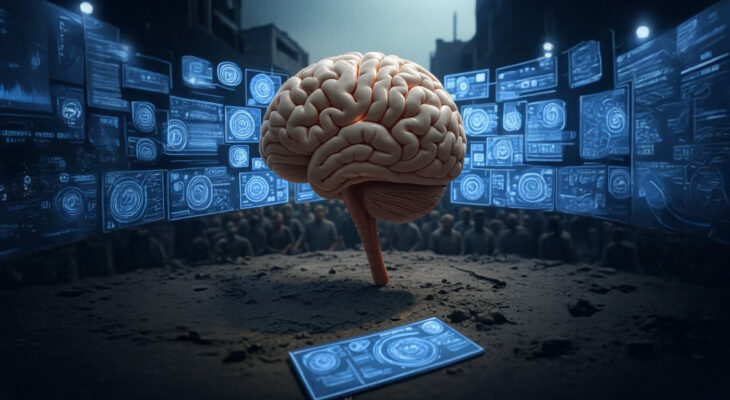Look at us, the pinnacle of evolution, heading for Idiocracy through over-reliance on Artificial Intelligence.
Through our species’ history we’ve used our brains to defeat everything from lions to cave bears, to overcome any and all environmental challenges, to create tools and technologies, and to innovate solutions in order to become the dominant species on this planet… only to finally hand those brains over to a soulless machine because we now can’t even decide where to go and eat dinner or what to say on a date, without consulting “the ever-present digital oracle.“
AI Is Making Us Dumber!

If you’re one of those rare holdouts still using your gray matter for more than scrolling through cat videos, you’ve probably noticed it: friends zoning out mid-conversation to ask ChatGPT what to text their crush, family members letting AI pick their vacation spots, or colleagues querying Gemini about which restaurant to choose for dinner.
It’s almost endearing, in a tragic sort of way…
But let’s cut the sarcasm for a second. This excessive reliance on AI isn’t just lazy; it’s actively eroding our cognitive abilities and fostering widespread deficits in critical thinking, independent decision-making, and personal discernment. And if we keep it up, we’re barreling headlong toward a future that makes the movie “Idiocracy” look like a documentary about Mensa meetings.
First Things First: What Even Is A Cognitive Deficit?
It’s not just some fancy term for forgetting where you left your keys (though that’s part of it.) It’s a decline in mental functions like memory, attention, problem-solving, and yes, that already endangered skill: critical thinking, which is to say “the ability to analyze, evaluate, and synthesize information without needing a kompoohtour to spoon-feed you the answers.”
In a world where AI handles everything from writing work emails to generating pickup lines, we’re offloading mental tasks so aggressively that our brains are starting to atrophy like unused muscles. Studies are piling up already, showing that heavy AI users are trading efficiency for a slow slide into cognitive mush.
It’s Called “Cognitive Offloading:” That’s The Fancy Psych Term For Dumping Your Thinking Onto An External Tool.
Effectively, it’s similar to using your phone’s GPS instead of navigating with a map or learning the roads around your city. Sure, you get there faster, but your spatial awareness turns to compost.
Now apply that to AI.
A recent MIT study found that students using ChatGPT for essay writing showed weakened brain connectivity in areas tied to attention, memory, and decision-making.
They couldn’t recall a single line from their “own” work, and even after ditching the AI, their brain function stayed suppressed.
We are borrowing against our future smarts to pay for today’s laziness, and we’re unlikely to be able to afford the interest on that loan.
And it’s not just academics; a Phys.org report highlights a significant negative correlation between AI tool usage and critical thinking scores, especially among younger folks who are glued to AI-driven devices 24/7.
You only need to look at the fact that “Grok, is that true?” has become one of the most commonly asked questions over on Xitter, to see that research and diligence have been abandoned in favor of excessive reliance on a quick answer from the machine.
What could possibly go wrong?
And that’s without even taking into consideration the fact that “Facts and Truth are WHATEVER X’s AI teams choose to program into Grok’s algorithms.”
But that aspect is for another article…
Look Around: It’s Happening To People You Know, Right Now
Let’s focus on a couple of everyday scenarios that make you, an actual critically thinking human being, want to scream into the void:
Your best friend can’t pick a restaurant without querying Google’s Gemini for “best Italian near me with 4.5 stars or more and gluten-free options.”
Why bother weighing pros and cons, reading reviews critically, or – gasp! – trusting your own taste buds? AI simply spits out a recommendation based on your search parameters, and boom, decision made. No mental effort required.
Similarly, on dating apps, people are letting algorithms craft their witty banter. “What should I say to this match?” they type into Grok or whatever, only to get a generic response that sounds like every other AI-generated quip.
The result?
Your match will come right back with another AI-generated piece of romantic mediocrity, thus giving a new meaning to the term “computer dating.“
I sure hope your AI likes theirs…
And so, we’re progressively producing a generation that’s losing the art of independent thought, a generation for whom every choice is mediated by a machine which doesn’t give a crap if you’re eating at a soul-sucking restaurant chain or flirting like a braindead lounge lizard from a 70s blacksploitation movie.
Unable to muster up even an ounce of personal discernment, they become part of the AI hivemind, a homgenized accumulation of biomass beholden to the machine’s spewings.
Deus Ex Machina (God From The Machine)
Sounds just dreamy, doesn’t it?
As one study puts it, this over-reliance on AI reduces mental engagement, leading to decreased stimulation and, ultimately, a significant dulling of the mind.
But Hey… Who Needs To Think Critically When AI Does It For You?

Except, Spoiler Alert: AI doesn’t ACTUALLY think critically; it simply pattern-matches from vast datasets and produces the “most likely result” based on a user’s query.
Worse still, AI often “hallucinates” facts or biases along the way.
AI hallucinations occur when large language models generate plausible-sounding but factually incorrect or fabricated information, often because they predict responses based on statistical patterns in their training data, rather than true comprehension or verified knowledge.
This can stem from ambiguities in queries, gaps in training data, or the model’s tendency to blankly “fill in” details without internal fact-checking mechanisms.
But anyways…
Microsoft research echoes the above study, warning that heavily relying on AI impairs critical thinking skills, as users perceive the tool to simply be “handling the heavy lifting,” leading them to a false sense of active mental engagement.
And let’s not forget all the chatter over on X… Where countless critically-thinking people regularly vent about how “AI is brain rotting society,” with one user quipping that “it’s turning us into passive consumers of fabricated info.”
Another X user shares horror visions of cognitive decline in just a few months of use.
Project this forward and it’s not pretty. As AI infiltrates more of everyday life, from career advice to medical queries, we’re creating a substantial chunk of humanity that’s increasingly unable to think without a prompt.
Critical thinking? Independent, informed decisions? Those become relics, like rotary phones or actual paper books.
Other studies warn of “digital dementia,“ where constant offloading exacerbates attention deficits and memory loss, much like how overusing calculators dumbs down mental math. Younger generations, already showing significantly higher AI dependence and lower problem-solving scores, are the canaries in this coal mine… and the long-term outlook is bleak.
Fast-forward a few decades, and we will approximate Idiocracy: a world where electrolytes are for plants (because AI said so,) and where basic logic is outsourced to apps that crash half the time.
Society dumbs down not through some genetic fluke, but from willful cognitive surrender. Creativity homogenizes into repetitive machine-generated slop, ownership over ideas evaporates, and we’re left with a populace that’s efficient at “nothing but prompting.”
“But AI Is A Tool For Enhancement, Not Replacement!” I Hear You Cry.

Sure, when used sparingly, AI can actively support learning.
But the real-world evidence screams loud and clear: excessive use correlates with eroded mental skills across the board.
Even skeptics of the field of “AI-based Cognitive Decline” admit that the threat is real, though they quibble about the extent.
For you, the observer watching your friends and loved ones devolve into AI-dependent zombies, all this should be a massive wake-up call.
Resist The Siren Song Of Convenience
- Make that restaurant choice yourself… debate it, regret it, learn from it.
- Craft your own awkward dating lines; at least they’ll be authentically yours.
- Drive to the corner store without using GPS. If you get lost, retrace your route.
- Seek out “real” minds instead of AIs for “companionship” or “therapy.” Foster the bonds that make us human.
There are so many, many ways to keep away the brain rot, if only you think about it for a moment.
Of course, if you’re not sure what those ways are, you can simply “Ask AI.”
No… Don’t…
Think for yourself. It’s not really that hard. But then, if you’re reading this you know that already.
Because, seriously, if we don’t resist offloading our mental tasks onto the machine – for convenience – we’ll wake up in a world where thinking is redundant, and idiocy is the default setting.
In the end, AI isn’t the villain; our laziness is.

